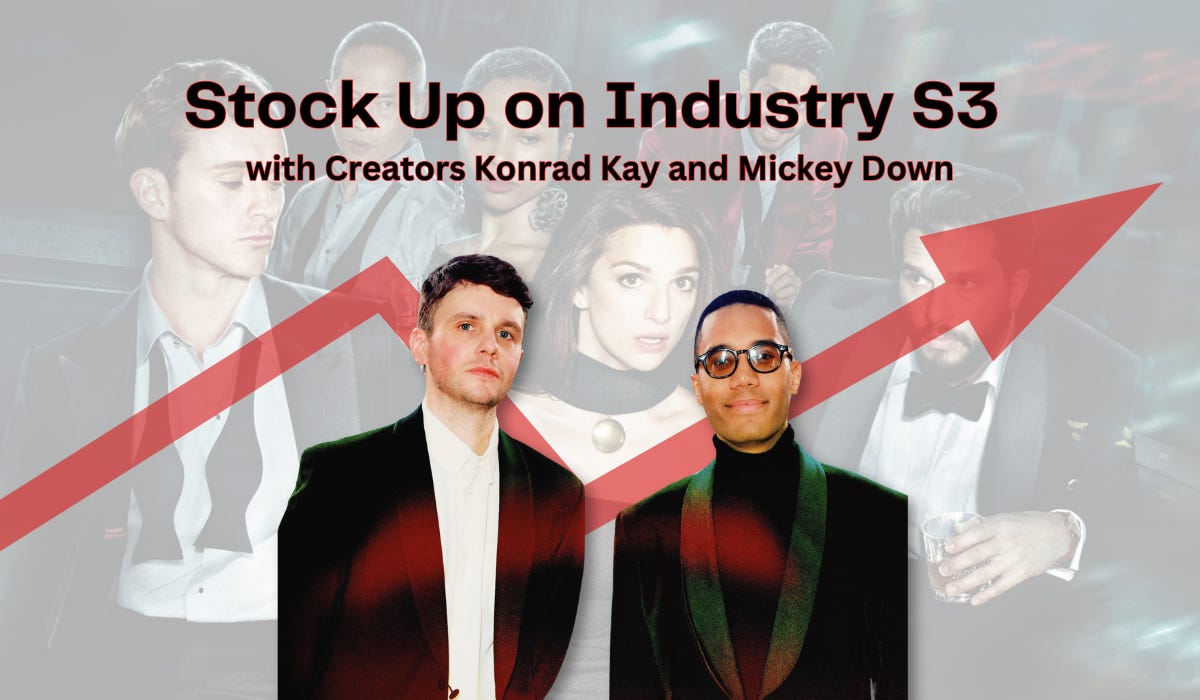Weekend Read: Stock Up on 'Industry' S3 with Creators Konrad Kay and Mickey Down
“Discontent and unhappiness are not the same... If we were content, we wouldn’t want to keep moving forward or be doing Season Four."
It’s no secret that we love Industry here at The Schmear Hunter. After recapping the show weekly on The SchmearCast, thanks to you, dear listeners, we reached out to the show’s creators, Konrad Kay and Mickey Down—who, as fans of the pod themselves, graciously agreed to an interview.
Below is an edited and condensed version of that conversation between me, frequent SchmearCast guests, Jesse Aaronson and Sena Adjei, Konrad and Mickey.
Why can’t the characters find happiness? What is the ethos of the show? Best needle-drop this season? What’s Harper Stern’s favorite movie? Who’s the dream casting choice for Season 4?
All of that is answered.
Enjoy!
(light spoilers for S3 ahead)
Schmear Hunter: Mickey and Konrad, welcome to The Schmearcast! We are so excited to have you here. We've been recapping Industry Season Three all season, and our listeners are loving it, and this is such a treat to have you guys on. How are you guys feeling today?
Mickey Down: We're good. Your recaps are excellent, guys. We really enjoyed listening to them. They're some of the best analyses of the show we've heard. And there's been a fuck-load of analysis, to the point where I'm bloody bored of it all. I can't wait for it to be over.
Konrad Kay: I was pretty moved, actually, listening to you guys talk about the finale. My girlfriend was out drinking, and I was alone in bed. I had just watched a movie and thought, "I've got to go to bed. I'm going to put The Schmear guys on." Sena, I think you sent a voice note—you were very emotional. I was like, "This is so crazy that these guys, who Mickey and I have never met..." But just hearing how it connected with you guys... I'm quite an unemotional person, but I was very moved. I thought it was amazing.
Sena Adjei: I'm trying not to be mortified. I'm glad that you listened and didn’t think it was corny.
Konrad Kay: I thought it was lovely. Hearing you guys talk about it—Mickey's not exaggerating—your level of insight and analysis has been some of the best on the internet, up there with the very best. We really appreciate it.
Schmear Hunter: No, we appreciate that too. So, Season Three is done, but I want to take it back to the beginning. Where did the inspiration for Rob, Yaz, and Harper come from? I know the performers play a huge role in bringing them to life, but how did these characters first come to you? Were they inspired by anyone or anything specifically?
Mickey Down: Um, a little bit. When we were formulating the show, Konrad and I had worked in the business, and we’d met lots of archetypal characters, including friends who had fallen into it the same way we had.
We were coming up with a show based in banking, and the first thing that unlocked it for us was writing from the perspective of people coming into the business, not those at the top—people trying to accrue power, not those who already had it. That was us—people with no idea what they were doing, some ill-suited for the job.
We didn’t aim to find the most unexpected people to tell this story through; instead, we asked, "What kind of people are prevalent in this business but have never been seen on TV before?" We wanted a broad canvas of different backgrounds and socioeconomic statuses, and we always knew it would be female-led. Harper had different permutations. At one point, she was at Harvard, doing a banking interview via Zoom.
For Harper, we knew if we were doing a show about a New Yorker in London and the accruing of power, she had to start with nothing. She had to feel like an outsider, someone moving through the world without knowing the codes of conduct of London society. That’s where Harper came from. We had a rough idea of her, but when we got into the writers' room for the first season, we really threw everything at the wall to figure it out.
Sena Adjei: I don’t know if you realize how much characters like Gus, and especially Harper, have been embraced by the internet, particularly Black people and Black women. It’s so interesting, especially with Harper, because of the decisions she’s allowed to make through your writing. I’m wondering, why do you think she translates so clearly? Most of my circles are American, and there are many Harper Hive group messages and Twitter threads. Why do you think that lands, even though she makes decisions that some people might find reprehensible?
Mickey Down: Well, I think that’s why it lands. We’ve been asked this before, and my response is that Harper and Gus represent a way of being Black that I haven’t seen on TV, especially in the UK. The idea that a character’s journey, motivation, or even ending is dictated by their background is anathema to everything I believe in. The idea that the Black guy can never be the bad guy or behave a certain way is totally against what I feel as a creative person.
I like that Harper’s hard to categorize—she’s avaricious and self-centered, traits seen in the great white male TV anti-heroes of the past, but we put that in a young Black woman….
To read more about the behind-the-scenes decisions and what to expect in Industry S4, subscribe now to unlock the full interview with Mickey and Konrad.






